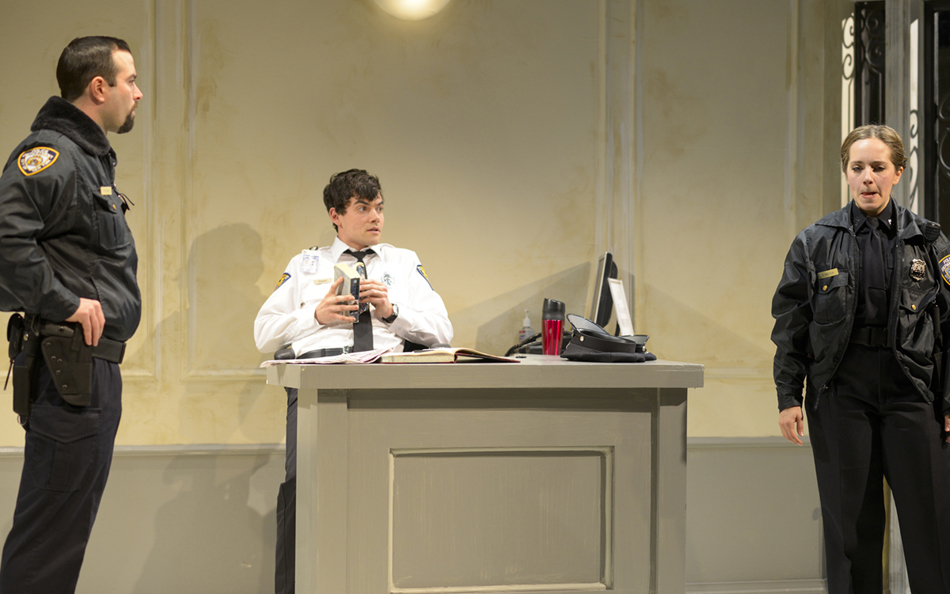
Lobby Hero by Kenneth Lonergan. Directed by Matthew Decker. Through March 13, 2016 at Theatre Horizon, Norristown, PA
This play poses a provocative dilemma: To what extent may you lie in an effort to protect someone you care for?
Imagine living in Nazi Germany and being questioned about the whereabouts of your close friend who is Jewish. Of course you won’t tell the gestapo what you know.
But this isn’t Nazi Germany, as one of Kenneth Lonergan’s characters points out. It’s more complicated. We live in a different world with varying shades of gray. There is ambiguity about how to behave in a difficult situation.
The play is set in the lobby of a Manhattan apartment building. One of the four characters is a black man whose brother is arrested for a violent crime. The brother is assigned an incompetent defense attorney. Considering the inept attorney, plus the probability that a judge and jury will tend to believe that a black defendant is guilty, isn’t it understandable for our protagonist to invent an alibi for his brother?
At the night desk is the well-meaning security guard, Jeff. His boss is William, the intelligent and disciplined captain for the security company, who happens to be black. Into the scene come two cops, the aggressive Bill and his rookie female partner Dawn.
Jeff is a genial slacker who is a compulsive talker—certainly not the sort of person you’d trust to keep a secret. But William is troubled by what he’s done and feels a need to confide in someone, so William tells him what happened.
Bill is a cop who has no qualms about violating rules to protect the people on his beat, as he sees it. Or to fulfill his own desires. The self-centered Bill has an affair with a tenant in the apartment building while also demanding that his partner satisfy him sexually.
Dawn is the most tortured of the characters. Abused by her partner and intimidated by the fact that she’s a lone woman in a macho male world, she yearns to stand up and do what’s right, to do something that’s honorable. She thus takes an action that violates a confidentiality offered by a friend.
This is a play of ideas, leavened with comic moments. A wistful sense of melancholy inhabits it. Some of the plot points in Lobby Hero are contrived, however. For example, we see no motivation for Bill when he goes out of his way to back up William and his brother.
The pivotal part of Jeff can be portrayed in dissimilar ways. He was interpreted in the Playwrights Horizons 2001 premiere as a hip wiseguy and in another production as a sad sack loser. Brian Ratcliffe, as directed by Matthew Decker, is a perpetually-smiling chatterbox. He wins our hearts, even though his impetuous actions drive us crazy.
Rachel Camp gives rich and believable depth to the character of the intimidated Dawn; she is tough but appealingly vulnerable. Kevin Meehan is a powerful Bill in a role that otherwise could seem one-dimensional. Akeem Davis is stalwart as the upwardly striving William. Decker’s direction is compelling. The set by Maura Roche is spot on.
In the end, Lobby Hero leaves us pondering the questions: Is loyalty more of a virtue than honesty? Could loyalty be just another word for corruption? Is it dishonest to simply keep your mouth shut?
The play also causes us to ponder how downtrodden folks can ever get off the bottom floor—the lobby—of life. Jeff says, “I just don’t want to be one of those pathetic guys in lobbies who are always telling you about their big plans to do some kind of shit you know goddamn well they’re never going to.” The ambivalent ending of Lobby Hero keeps us wondering.
Please share your thoughts and your opinions with us. Address to editor@theculturalcritic.com
Read other reviews on The Cultural Critic